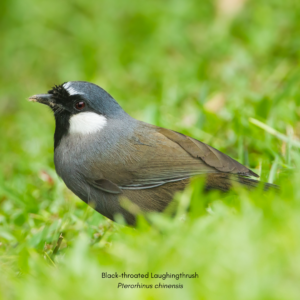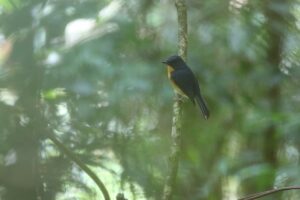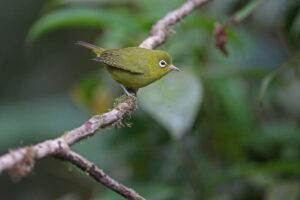The Black-throated Laughingthrush Pterorhinus chinensis is one of many songbird species impacted by trade. Found in Cambodia, China, Lao PDR, Myanmar, Thailand and Vietnam, it is sought-after by songbird hobbyists locally and abroad.
The number of songbirds negatively affected by unsustainable trade, especially in Asia, continues to grow. Only a few species are protected where they occur naturally, and fewer still are internationally protected through the Convention on International Trade in Endangered Species of Wild Fauna and Flora (CITES), meaning there is no mechanism to regulate or formally document international trade in that species. This undermines possibilities to protect these songbirds and regulate international trade.
To determine levels of national and international trade, researchers examined Black-throated Laughingthrush trade records extracted from published and unpublished market studies undertaken in parts of Asia and the United States of America (USA). The aim of the study was to establish if listing the Black-throated Laughingthrush in CITES is warranted and further, to identify actions needed to mitigate commercial trade as a threat.

Trade data from the range countries of Thailand and Vietnam as well as from Indonesia and USA, both non-range countries, revealed 10,841 records of Black-throated Laughingthrushes in trade, across 762 visits to 51 markets between 1966 and 2019. The majority (63%) were recorded in locations outside the species’ range. Interesting too was that the highest prices were recorded in the USA and the lowest in Thailand, and that price dynamics in Indonesia indicated high demand and increasing scarcity. The scarcity of the laughingthrushes could be due to rarity in the wild or fewer birds available in the market due to tighter import restrictions – or a combination of both.
At least 4,071 individuals were observed for sale in locations where they are currently protected. The study also found 76 individuals imported into the USA in 2017–2018. While these were recorded as captive bred and having been imported from Senegal for commercial purposes, it is still not clear if this odd case is a transshipment, exports from a captive breeder, or a clerical mistake.
In the European Union (EU), commercial import of the Black-throated Laughingthrush has been restricted since 2005, though imports as ‘personal pets’ are permitted if they come from approved establishments. Despite the restrictions however, it appears as if illegal imports from the wild still occur.
Given the scale of international trade, evidence of illegal imports and the continual decline in wild populations, we recommend that the Black-throated Laughingthrush be included in Appendix II of CITES, to facilitate better documentation and regulation of trade. An Appendix II listing would enable scrutiny of trade dynamics by range countries and to flag any concern on the sustainability of trade as well as limit opportunities for illegal trade through the permitting system.
The authors urge that range countries join forces to propose the CITES listing to protect their native Black-throated Laughingthrush in Appendix at the next Conference of the Parties (CoP20) and request importing countries to support this proposal.
The authors also call on importing countries to use a CITES II listing as a measure to prevent illegal, unsustainable or unregulated imports of Black-throated Laughingthrushes to their territories.
Read the full paper here:
Global commercialisation, under-reported trade, and the need for increased international regulation of a non-CITES listed songbird by Chris R. Shepherd, Boyd T.C. Leupen, S. Sunny Nelson, Lalita Gomez, John A. Allcock, Simon Bruslund, Caroline Dingle and Vincent Nijman was published in the Journal of Asian Ornithology, Vol. 39 (2023).
Read about other laughingthrushes and CITES here: Sumatran Laughingthrush and Chinese Hwamei


